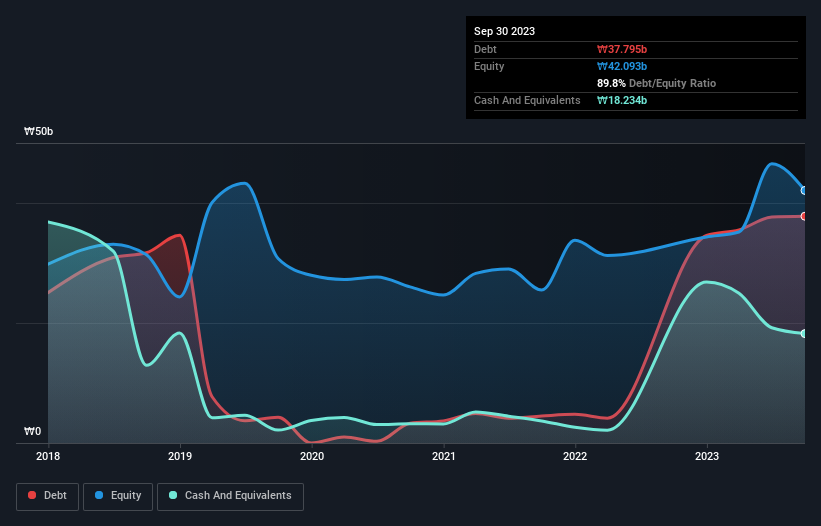
Some say volatility, rather than debt, is the best way to think about risk as an investor, but Warren Buffett famously said that 'Volatility is far from synonymous with risk.' When we think about how risky a company is, we always like to look at its use of debt, since debt overload can lead to ruin. Importantly, Dx & Vx Co., Ltd. (KOSDAQ:180400) does carry debt. But is this debt a concern to shareholders?
What Risk Does Debt Bring?
Debt and other liabilities become risky for a business when it cannot easily fulfill those obligations, either with free cash flow or by raising capital at an attractive price. Ultimately, if the company can't fulfill its legal obligations to repay debt, shareholders could walk away with nothing. However, a more common (but still painful) scenario is that it has to raise new equity capital at a low price, thus permanently diluting shareholders. Of course, the upside of debt is that it often represents cheap capital, especially when it replaces dilution in a company with the ability to reinvest at high rates of return. The first thing to do when considering how much debt a business uses is to look at its cash and debt together.
See our latest analysis for Dx & Vx
What Is Dx & Vx's Net Debt?
As you can see below, at the end of September 2023, Dx & Vx had ₩37.8b of debt, up from ₩34.6b a year ago. Click the image for more detail. On the flip side, it has ₩18.2b in cash leading to net debt of about ₩19.6b.

A Look At Dx & Vx's Liabilities
According to the last reported balance sheet, Dx & Vx had liabilities of ₩36.8b due within 12 months, and liabilities of ₩25.8b due beyond 12 months. Offsetting this, it had ₩18.2b in cash and ₩8.66b in receivables that were due within 12 months. So its liabilities outweigh the sum of its cash and (near-term) receivables by ₩35.7b.
This deficit isn't so bad because Dx & Vx is worth ₩128.6b, and thus could probably raise enough capital to shore up its balance sheet, if the need arose. But we definitely want to keep our eyes open to indications that its debt is bringing too much risk. When analysing debt levels, the balance sheet is the obvious place to start. But it is Dx & Vx's earnings that will influence how the balance sheet holds up in the future. So if you're keen to discover more about its earnings, it might be worth checking out this graph of its long term earnings trend.
In the last year Dx & Vx wasn't profitable at an EBIT level, but managed to grow its revenue by 77%, to ₩45b. With any luck the company will be able to grow its way to profitability.
Caveat Emptor
While we can certainly appreciate Dx & Vx's revenue growth, its earnings before interest and tax (EBIT) loss is not ideal. To be specific the EBIT loss came in at ₩5.2b. When we look at that and recall the liabilities on its balance sheet, relative to cash, it seems unwise to us for the company to have any debt. Quite frankly we think the balance sheet is far from match-fit, although it could be improved with time. Another cause for caution is that is bled ₩7.6b in negative free cash flow over the last twelve months. So suffice it to say we consider the stock very risky. When analysing debt levels, the balance sheet is the obvious place to start. But ultimately, every company can contain risks that exist outside of the balance sheet. To that end, you should be aware of the 3 warning signs we've spotted with Dx & Vx .
When all is said and done, sometimes its easier to focus on companies that don't even need debt. Readers can access a list of growth stocks with zero net debt 100% free, right now.
New: Manage All Your Stock Portfolios in One Place
We've created the ultimate portfolio companion for stock investors, and it's free.
• Connect an unlimited number of Portfolios and see your total in one currency
• Be alerted to new Warning Signs or Risks via email or mobile
• Track the Fair Value of your stocks
Have feedback on this article? Concerned about the content? Get in touch with us directly. Alternatively, email editorial-team (at) simplywallst.com.
This article by Simply Wall St is general in nature. We provide commentary based on historical data and analyst forecasts only using an unbiased methodology and our articles are not intended to be financial advice. It does not constitute a recommendation to buy or sell any stock, and does not take account of your objectives, or your financial situation. We aim to bring you long-term focused analysis driven by fundamental data. Note that our analysis may not factor in the latest price-sensitive company announcements or qualitative material. Simply Wall St has no position in any stocks mentioned.
About KOSDAQ:A180400
Dx & Vx
Engages in the development and sale of bio-health care products and provides molecular genetic testing services primarily in South Korea.
Moderate and slightly overvalued.
Market Insights
Community Narratives



